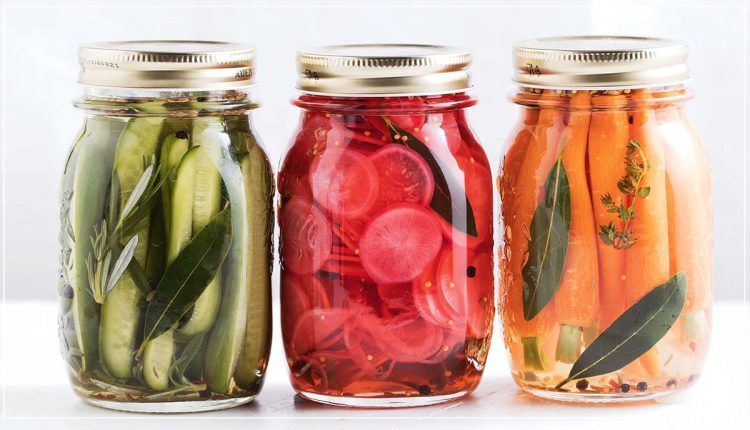
Types of Pickles and Their benefits
Being an Asian, it’s almost unnatural if we don’t enjoy having pickles along with our food. The pros of eating a zesty blast of flavor to enliven your main course sometimes ends up becoming a debatable topic against the cons of eating a staple that has a lot of sodium (salt). We cannot blame the recipe because the process of pickling any fruit or vegetable actually implies that we are preserving it for a period of time that extends it’s natural expectancy. So, if you really are a fan of having pickles and your argument rests on all the health benefits of our beloved seasoned ‘Achar’, it is still advised that we consume it in moderation. For my readers who just can’t wait to dig into the savory benefits of the extensively varied flavors of pickles all over the country; let’s begin
Basically what goes on when you put your pickling gloves on; you create a preservative that has significantly nullified the naturally occurring microbes in the food which cause them to decay. This is achieved by fermenting the ingredients in oil, vinegar, salt or sugar.
1. Mixed Pickle
Manufacturers go in a pickle when they get set to create a “mixed” pickle. The vast array of ingredients involved in making the widely consumed pickle is ever changing. The commonly used fruits and vegetables involved in making mixed pickle include lemons, cucumbers, carrots, cauliflowers, mangoes and some seasonings like garlic, pepper, coriander, sugar and vinegar.
Mixed pickle is high on probiotic content (fermentation, pickling, yogurt are all now clicking in a chain seamlessly). This means that it will actually encourage the good bacteria in your stomach to grow, which will lead to have an improved digestion. The pickle actually helps get the best out of our food. It cannot be consumed in high quantity itself. Keep in mind that pickles that are high on probiotic content, contain a very high amount of preservative. But since we consume it as a flavor enhancing additive, the chances of getting blood pressure problem is low.
2. Mango Pickle
The beauty of fermentation is that you require no heat for the process to get going. Voila, no nutritional content of the ingredients ever gets lost when you make pickles. Mango pickles actually help rejuvenate the inner organs because pickles naturally contain antioxidants. Antioxidants, as we all know, help get rid of the free oxygen molecules in our body that may cause aging. Also, the nutritional benefits you can get when eating mangoes are directly inherited in the pickle. But, as always, it’s highly recommended to consume pickles in a moderate manner.
3. Cucumber Pickle
Pickles prepared with vinegar help with diabetes control. The high amount of acetic acid (the content vinegar is made of) helps control the hemoglobin in our blood. This causes the excess calories to digest which helps monitor the sugar level of diabetic patients. But for this, only consume the pickles that do not have excess salt in them. Otherwise, you’re just trading one blood disease for another.
4. Gooseberry Pickle (Amla)
Your liver loves this one because the fermented version of Amla reduces ulcers, protects the liver from overall damage and as a result increases our overall immunity to diseases. Being rich in Vitamin K, they are particularly effective in boosting our body’s reaction to injuries. Our blood clots faster and the loss of blood is low. This is by far the best benefit of our almost daily consumed achar.
5. Lime, Chili and Lemon Pickles
Adding other fruits or vegetable in these pickles produce a staple that is high in fiber and actually helps you reduce your weight by increasing your metabolism. Consuming achar as a savory staple with your main dish allows the stomach to extract as much nutritional content from our food and at the same time boosts our metabolism and thus allows us to effectively burn off the extra calories without gaining any extra (much dreaded) weight.

